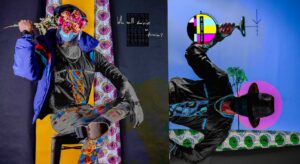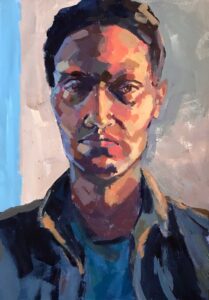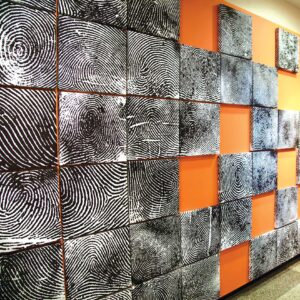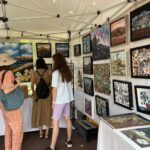‘States of Becoming’ explores cultural and artistic impacts of the African diaspora

Banner Arts & Culture Sponsored by Cruz Companies
Relocation, resettling and assimilation are components of the African diasporic experience that have significantly impacted the artists in “States of Becoming,” an exhibition of contemporary African artists at the McMullen Museum of Art at Boston College.
Curated by Fitsum Shebeshe and produced by Independent Curators International (ICI), the exhibition displays work by 17 artists who have migrated from different regions of Africa to the United States. The show explores how that resettlement has impacted the artists’ work and their sense of identity.
“Although practicing in a wide variety of mediums, these artists are united in the important questions their works probe about the role of relocation in reimagining hybrid identities and a sense of belonging,” says Nancy Netzer, inaugural Robert L. and Judith T. Winston director of the McMullen Museum of Art and a Boston College professor of art history. “Such questions are fundamental to the liberal arts education at Boston College and, especially, to the pedagogy and research of our faculty in African and African Diaspora Studies,” she said.
The exhibition features artists Chukwudumebi Gabriel Amadi-Emina, Kearra Amaya Gopee, Kibrom Araya, Nadia Ayari, Vamba Bility, Elshafei Dafalla, Masimba Hwati, Chido Johnson, Miatta Kawinzi, Dora King, Helina Metaferia, Nontsikelelo Mutiti, Yvonne Osei, Kern Samuel, Amare Selfu, Tariku Shiferaw and Yacine Tilala Fall.
Working in a variety of media, the artists came from 12 different countries in Africa and one in the Caribbean, spanning from Ethiopa, Ghana and Kenya to Trinidad, Senegal and Sierra Leone.
Three groupings organize the exhibition. One illustrates how the artists’ works changed aesthetically due to their relocation, one shows how artists have brought elements of their home culture to their new country and the third displays ways in which the artists have merged influences from both their identities.
“The artists’ approach this phenomenon by engaging across multiple subjects including history, sociology, politics, visual and performing arts, literature, etc.,” said Lorelle Semley, a BC professor of history and director of the college’s African and African Diaspora Studies Programs. “Similarly, African diaspora studies puts different disciplines into dialogue, often through the creative use of materials and methods.”

Chukwudumebi Gabriel Amadi-Emina, “Fade Catcher,” 2021. Matte inkjet prints mounted on dibond. Courtesy the artist.
Curator Shebeshe came to Baltimore, Maryland, in 2016 by way of Addis Ababa, Ethiopia’s capital and largest city. He hopes the exhibition appeals to those who have experienced the torn feeling of relocation and opens the eyes of those who haven’t experienced how the diaspora creates multiple identities and perspectives.
“This exhibition allows for further understanding of not only my own experiences, but those of the artists,” said Shebeshe. “By analyzing both the unique aspects and commonalities…we can reimagine together how we think identity is continually shaped and reshaped.”









